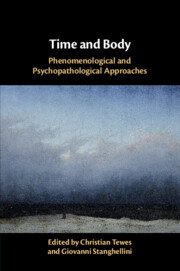Book contents
- Time and Body
- Endorsements for Time and Body
- Time and Body
- Copyright page
- Dedication
- Additional material
- Contents
- Figures
- Contributors
- 1 Introduction – Time and Body
- 2 Time, the Body, and the Other in Phenomenology and Psychopathology
- Part I Body and Time: General Aspects
- 3 The Body – Another
- 3.1 Commentary on “The Body – Another: Phenomenological and Psychoanalytic Perspectives”
- 4 The Heart of Darkness of the Living Body
- 4.1 Commentary on “The Heart of Darkness of the Living Body”
- 5 Microphenomenology of Chronicity in Psychosomatic Diseases
- 5.1 Commentary on “Microphenomenology of Chronicity in Psychosomatic Diseases: Diabetes, Anorexia, and Schizophrenia”
- 6 Time and Embodiment in the Process of Psychotherapy: A Dynamical Systems Perspective
- 6.1 Commentary on “Time and Embodiment in the Process of Psychotherapy: A Dynamical Systems Perspective”The Musicality of Human Interaction
- Part II Grief and Anxiety
- Part III Borderline Personality and Eating Disorders
- Part IV Depression, Schizophrenia, and Dementia
- Index
- References
3 - The Body – Another
Phenomenological and Psychoanalytic Perspectives
from Part I - Body and Time: General Aspects
Published online by Cambridge University Press: 30 October 2020
- Time and Body
- Endorsements for Time and Body
- Time and Body
- Copyright page
- Dedication
- Additional material
- Contents
- Figures
- Contributors
- 1 Introduction – Time and Body
- 2 Time, the Body, and the Other in Phenomenology and Psychopathology
- Part I Body and Time: General Aspects
- 3 The Body – Another
- 3.1 Commentary on “The Body – Another: Phenomenological and Psychoanalytic Perspectives”
- 4 The Heart of Darkness of the Living Body
- 4.1 Commentary on “The Heart of Darkness of the Living Body”
- 5 Microphenomenology of Chronicity in Psychosomatic Diseases
- 5.1 Commentary on “Microphenomenology of Chronicity in Psychosomatic Diseases: Diabetes, Anorexia, and Schizophrenia”
- 6 Time and Embodiment in the Process of Psychotherapy: A Dynamical Systems Perspective
- 6.1 Commentary on “Time and Embodiment in the Process of Psychotherapy: A Dynamical Systems Perspective”The Musicality of Human Interaction
- Part II Grief and Anxiety
- Part III Borderline Personality and Eating Disorders
- Part IV Depression, Schizophrenia, and Dementia
- Index
- References
Summary
In this contribution, I consider what we call “body” and its role in clinical practices. My chapter draws upon the ideas of Maurice Merleau-Ponty and Jacques Lacan. This allows me to consider not only the body as a materiality structured by its finitude, not only the body as a locus of our lived experiences, not only the body as anchoring our actions, but also the body as it incarnates otherness. Otherness is here understood as twofold: On the one hand, the body as a living organism is a generality and its functioning hosts a germ of depersonalization; on the other hand, and at the same time, the body is that which keeps any other subject away from me, separated from me, irreducible to me. It thus appears that the body is both at once a concretion of alterity and of singularity. On the basis of such a conceptualization of the body, I consider the possibility of designing a clinical practice informed by both Merleau-Ponty and Lacan.
- Type
- Chapter
- Information
- Time and BodyPhenomenological and Psychopathological Approaches, pp. 43 - 54Publisher: Cambridge University PressPrint publication year: 2020

